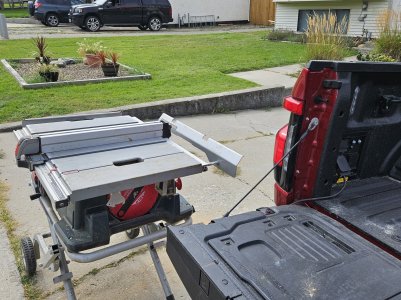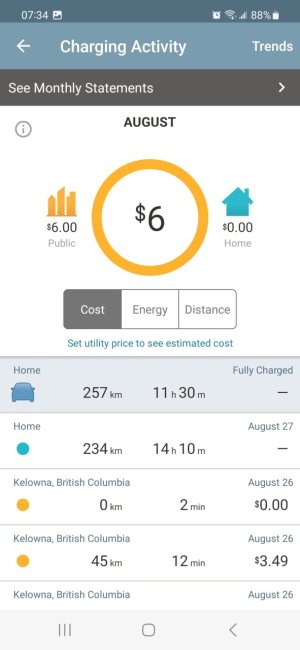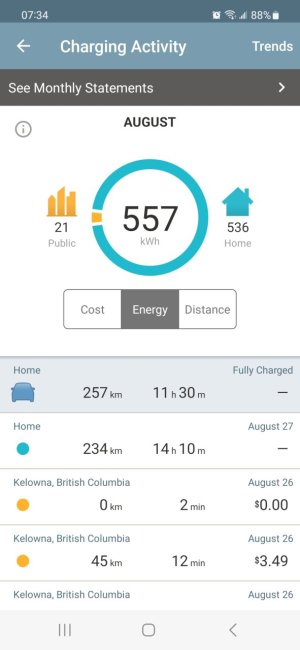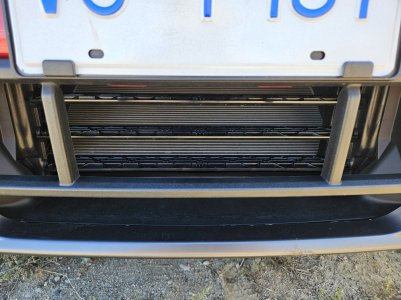I wouldn't count on too many charging stations once you get past Prince George. Many hunters need to pack a few gerry cans of extra fuel to access back country hunting locations.As for the generator question, don't you gas up your truck at the last place possible before heading into hunting camp? Same sort of practice would apply to an EV truck.
You are using an out of date browser. It may not display this or other websites correctly.
You should upgrade or use an alternative browser.
You should upgrade or use an alternative browser.
Driving an EV pickup
- Thread starter sly_karma
- Start date
Baxter
Well-Known Member
Interesting thread.
While I would love one, I have a few hesitations around buying an electric truck. The first is that I am a bit of a Toyota purist. (I have had bad luck with Fords and pledged to never buy another ever - but don't want to turn this into a brand "pissing contest"). Toyota of course does not have a pure electric Tundra - maybe some day, but no time soon.
The big issue I have with electric trucks is range & towing. I often tow our 7000lb camper to Port McNeill, Tofino and other similar distances. All of which would come close to max range without towing no idea what the range with a big trailer would be - so this means most likely any E-Truck would require charging along the way, perhaps multiple times. Charging with a 30' trailer in tow could be a nightmare.
We will likely replace my wifes car with something electric in the near future, but I don't envision an electric truck for me for some time unless an affordable option (preferably by Toyota) with a VERY long range becomes available, but not holding my breath on that.
While I would love one, I have a few hesitations around buying an electric truck. The first is that I am a bit of a Toyota purist. (I have had bad luck with Fords and pledged to never buy another ever - but don't want to turn this into a brand "pissing contest"). Toyota of course does not have a pure electric Tundra - maybe some day, but no time soon.
The big issue I have with electric trucks is range & towing. I often tow our 7000lb camper to Port McNeill, Tofino and other similar distances. All of which would come close to max range without towing no idea what the range with a big trailer would be - so this means most likely any E-Truck would require charging along the way, perhaps multiple times. Charging with a 30' trailer in tow could be a nightmare.
We will likely replace my wifes car with something electric in the near future, but I don't envision an electric truck for me for some time unless an affordable option (preferably by Toyota) with a VERY long range becomes available, but not holding my breath on that.
sly_karma
Crew Member
30 ft boat or 7000 lb camper are both out at the very limit for any half ton truck. Most people would opt for 3/4 or 1 ton for that kind of work, unless a one off job.Interesting thread.
While I would love one, I have a few hesitations around buying an electric truck. The first is that I am a bit of a Toyota purist. (I have had bad luck with Fords and pledged to never buy another ever - but don't want to turn this into a brand "pissing contest"). Toyota of course does not have a pure electric Tundra - maybe some day, but no time soon.
The big issue I have with electric trucks is range & towing. I often tow our 7000lb camper to Port McNeill, Tofino and other similar distances. All of which would come close to max range without towing no idea what the range with a big trailer would be - so this means most likely any E-Truck would require charging along the way, perhaps multiple times. Charging with a 30' trailer in tow could be a nightmare.
We will likely replace my wifes car with something electric in the near future, but I don't envision an electric truck for me for some time unless an affordable option (preferably by Toyota) with a VERY long range becomes available, but not holding my breath on that.
We are at the beginning of EV pickups, and none yet on the market in the heavy duty sizes. I doubt we will see EV one ton trucks until the next generation of battery technology becomes available at scale. We need a magnitude improvement in energy density for the HD sizes to fit the expectations of potential buyers. With existing technology, you cant fit a monster battery into virtually the same size footprint as a half ton.
And you would need a really big battery. Half tons are versatile, they're the family station of the 21st century to fair extent. Yes, they'll work for hauling on short trips or light boats like mine, but anyone who's looking for a 3/4 or 1 ton has a reason: heavy bed or trailer loads. The extended range Lightning has a 130 kWh battery - double the size of a Tesla long range - yet it will still see its range cut to just 160 km if you hook up a 8000+ lb trailer.
Heavy duty guys won't accept that. They would realistically expect at least double that range, which of course means double the battery. But where do you put it when a 1 ton is only slightly longer and wider than a half ton? Make it thicker and you run into ground clearance and bed height issues.
So at the moment we are maxed out at half ton, until battery chemistry with double the density of existing systems becomes available and affordable. If your boat or trailer justifies a 3/4 or 1 ton tow vehicle now, keep that truck for a while. Be assured the auto makers who have a big stake in trucks are working very hard on the developments needed to make those bigger trucks a reality. Trucks are the golden goose for the American big three especially; you know they'll do almost anything to keep those profits flowing.
The first commercial EVs are only a dozen years old, look how far we've come from gen 1 cars like Nissan Leaf (24 kWh battery) and Mitsubishi iMiEV (16 kWh). Charging infrastructure is still in its early days too.
Baxter
Well-Known Member
30 ft boat or 7000 lb camper are both out at the very limit for any half ton truck. Most people would opt for 3/4 or 1 ton for that kind of work, unless a one off job.
I disagree with that. My tundra is rated to tow 9,980 lbs. I tow the travel trailer which is between 7,000 and 8,000 wet, and it tows with zero issues, handles awesome. Boat is far lighter, so of course no issues there either.
I do agree though, electric is not the right choice for a lot of applications, but yet it is the perfect choice for others (your situation for instance). I am certain that in time we will 100% see 1 ton electrics with extended ranges, probably into the 1000+ km range, but we have a long ways to go before we get there - but we will get there. Just look at where EVs were in recent history - they have come a LONG way and will continue to do so
sly_karma
Crew Member
A shorter road trip today, Penticton to Lavington (Vernon area). Mixed highway and city driving, 180 m net elevation gain. 25 kWh/100 km.
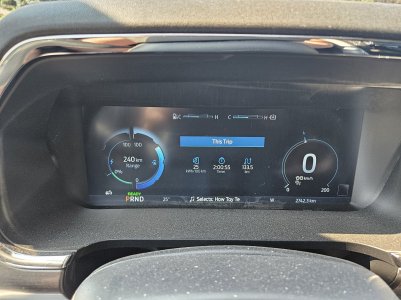
I had plenty of range to get home, but decided to check out charging at a gas station in Kelowna. Got connected, grabbed a drink, had a leak, took a pic. This would be a good one to use if towing.
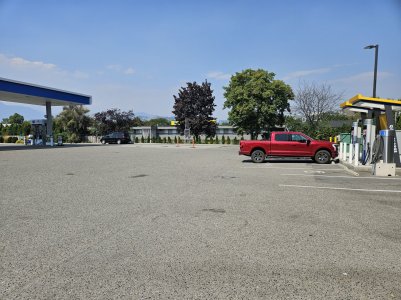

I had plenty of range to get home, but decided to check out charging at a gas station in Kelowna. Got connected, grabbed a drink, had a leak, took a pic. This would be a good one to use if towing.


2023 Ford F-150 Lightning: pricing slashed for the EV | Car News | Auto123
Ford of Canada announces significant price cuts for its 2023 F-150 Lightning model. Auto123 has the details.
sly_karma
Crew Member
My long wait for a Lightning turned out to be a blessing in disguise, as the price reduction happened just days before I picked mine up. Also dropped it just below the 70K ceiling for the federal and provincial rebates.
2023 Ford F-150 Lightning: pricing slashed for the EV | Car News | Auto123
Ford of Canada announces significant price cuts for its 2023 F-150 Lightning model. Auto123 has the details.www.auto123.com
Ford decided to build all the higher end Lariat and Platinum models at the start of their production run for MY2023. Those of us who ordered Pro and XLT had to wait and watch as dealer lots started displaying trucks at $125K (Platinum). Seems like a tactical error to me, as anyone off the street who took a look at a Lightning would have gone away convinced that the electric version of the F150 was crazy expensive. Yet the Pro (fleet buyers only) has MSRP of $59K and XLT is $69K. Those are both competitive with their Ecoboost counterparts.
I think Ford built too many luxury models in MY2023 and not enough of the more modest trim levels. The XLT and Pro production runs both sold out, you'll see the odd one on a lot where the person who ordered it pulled out of the deal.
CIVANO
Well-Known Member

Ford F-150 Electric Pickup May Get Newly Patented Range Extender in Its Bed
It looks deceptively like a toolbox, but it could be used to increase the range of the upcoming electric F-150 pickup truck.
sly_karma
Crew Member
First full month of charging logs.
536 kWh home charging @ $0.11=$58.96
$6.00 public charging
Energy cost for August: $64.96
Km driven: 2642
Cost per km: 2.5 cents per km.
For reference, cost of gas half ton averaging 15 L/100 km, with gas at $1.80/L: 27 cents per km.
As always, your mileage may vary. I took advantage of some free public charging out on the road trips I did. And most of my km were local region, so I could charge at home at the lowest rate. Still, it's a pretty compelling picture. Driving costs at a tenth of what it was before. And I won't be thinking about an oil change any time.
536 kWh home charging @ $0.11=$58.96
$6.00 public charging
Energy cost for August: $64.96
Km driven: 2642
Cost per km: 2.5 cents per km.
For reference, cost of gas half ton averaging 15 L/100 km, with gas at $1.80/L: 27 cents per km.
As always, your mileage may vary. I took advantage of some free public charging out on the road trips I did. And most of my km were local region, so I could charge at home at the lowest rate. Still, it's a pretty compelling picture. Driving costs at a tenth of what it was before. And I won't be thinking about an oil change any time.
Attachments
sly_karma
Crew Member
Someone asked me the other day "How long will it take you to pay down the price premium compared to a gas F150?". I wasn't completely sure, because there have been price changes all over the place. Yesterday I went looking on the Ford website, I 'built' a gas XLT with short box and supercrew cab, which is the only configuration offered with Lightning (so far).
XLT with 3.5 EcoBoost: $68,810 plus taxes = 77,067
XLT Lightning SR: $72,645 plus taxes = 81362
home charger, installed: $1200 1344
rebates (up to 9350 available) -6350
Net price $76,356
So with the rebates I'm a hair cheaper than the EcoBoost. Even without any rebates, the electric truck is $5000 more, so savings on fuel costs would put an owner ahead by the end of year 1. assuming I keep it 15 years like I usually do, the savings will cover the entire price of the truck itself.
XLT EcoBoost build sheet
XLT Lightning build sheet


XLT with 3.5 EcoBoost: $68,810 plus taxes = 77,067
XLT Lightning SR: $72,645 plus taxes = 81362
home charger, installed: $1200 1344
rebates (up to 9350 available) -6350
Net price $76,356
So with the rebates I'm a hair cheaper than the EcoBoost. Even without any rebates, the electric truck is $5000 more, so savings on fuel costs would put an owner ahead by the end of year 1. assuming I keep it 15 years like I usually do, the savings will cover the entire price of the truck itself.
XLT EcoBoost build sheet
XLT Lightning build sheet


sly_karma
Crew Member
I don't know. Then again, I've never priced out a new engine and transmission for any new gas vehicle in its first months of ownership either.How much is a new battery? That has to be factored into the long term financial plan
Ford has a 8 year/160,000 km warranty on battery. That's longer than the 5 years/100,000 km offered on their ICE power trains. Seems to indicate a fair degree of confidence in the product.
Except for manufacturing defects that reveal themselves within days or weeks, EV batteries don't fail like gas or diesel engines and transmissions do. They slowly lose their ability to hold a full charge. There's probably no Lightning out there yet with 320,000 km/200,000 miles, but Tesla have lots of their batteries out there with mileage like that. Their study shows average 12% range loss at 200,000 miles.
Applying that to my truck, at 320,000 km it would be 15 years old, and would drive much the same, but its range would be 345 km instead of the original 390. I wouldn't be thinking about battery replacement. It would be in the work fleet by then and doing all its km around the valley, so range would be ample. Even if it had lost 50% of range it would still work in that application. Anyway my son gets to think about that one, lol.

Tesla Shares Battery Life Span Data: Just 12% Degradation After 200,000 Miles
Tesla has an impressive lifespan of batteries, with just 12% degradation after 200,000 miles, and discover the factors that influence battery capacity retention
Aces
Well-Known Member
Thanks. I figured you’d have some kind of idea about that. That’s the same warranty Toyota gives on the hybrid batteryI don't know. Then again, I've never priced out a new engine and transmission for any new gas vehicle in its first months of ownership either.
Ford has a 8 year/160,000 km warranty on battery. That's longer than the 5 years/100,000 km offered on their ICE power trains. Seems to indicate a fair degree of confidence in the product.
Except for manufacturing defects that reveal themselves within days or weeks, EV batteries don't fail like gas or diesel engines and transmissions do. They slowly lose their ability to hold a full charge. There's probably no Lightning out there yet with 320,000 km/200,000 miles, but Tesla have lots of their batteries out there with mileage like that. Their study shows average 12% range loss at 200,000 miles.
Applying that to my truck, at 320,000 km it would be 15 years old, and would drive much the same, but its range would be 345 km instead of the original 390. I wouldn't be thinking about battery replacement. It would be in the work fleet by then and doing all its km around the valley, so range would be ample. Even if it had lost 50% of range it would still work in that application. Anyway my son gets to think about that one, lol.

Tesla Shares Battery Life Span Data: Just 12% Degradation After 200,000 Miles
Tesla has an impressive lifespan of batteries, with just 12% degradation after 200,000 miles, and discover the factors that influence battery capacity retentionwww.notateslaapp.com
sly_karma
Crew Member
8/160 seems to be fairly standard with EV makers at the moment.
First gen EVs like Mitsubishi iMiEV and Nissan Leaf lacked decent thermal control of their battery. The batteries were small to begin with and degraded quickly, many were down to 50% range within 5 years. This and the commonly observed need for battery replacement in cell phones built a perception that EV batteries wear out fast. Ever see an early series Android phone battery that had swelled up and become slightly barrel shaped? That was from repeated overheating during charge/discharge cycles.
A ton of work has been done on ensuring EV battery lifespan is as long as possible, a lot of it by Tesla. Current release EV power packs have sophisticated cooling and heating systems that keep battery temp at optimum temperature for driving, and they also adjust when the vehicle is charging. This is the key reason for range reduction in winter; running a little heating element in the coolant system uses more energy than just pumping it through a radiator in summer. On hot days or if the truck is parked in the sun, fans will run at startup to get things cooled down to optimum temp. May also occur during charging.
First gen EVs like Mitsubishi iMiEV and Nissan Leaf lacked decent thermal control of their battery. The batteries were small to begin with and degraded quickly, many were down to 50% range within 5 years. This and the commonly observed need for battery replacement in cell phones built a perception that EV batteries wear out fast. Ever see an early series Android phone battery that had swelled up and become slightly barrel shaped? That was from repeated overheating during charge/discharge cycles.
A ton of work has been done on ensuring EV battery lifespan is as long as possible, a lot of it by Tesla. Current release EV power packs have sophisticated cooling and heating systems that keep battery temp at optimum temperature for driving, and they also adjust when the vehicle is charging. This is the key reason for range reduction in winter; running a little heating element in the coolant system uses more energy than just pumping it through a radiator in summer. On hot days or if the truck is parked in the sun, fans will run at startup to get things cooled down to optimum temp. May also occur during charging.
sly_karma
Crew Member
I have a sorta EV/sorta truck question: All Weather tires, anyone using them on a truck? The factory tires on the Lightning are summer junk; come winter they'll be awful. But I really don't want the cost of rims as well as winter tires just a couple of months into a brand new truck. They're 20" so the choices aren't enormous.
Anyone got a recommendation for something winter-ish I can leave on all year?
Anyone got a recommendation for something winter-ish I can leave on all year?
sly_karma
Crew Member
PS, a curse on auto makers who deliberately spec smooth rubber at the factory so it makes the truck super quiet for test drives. Throwaway tires for a lot of owners, just to make a favorable impression in that first 15 minute drive.
May the fleas of a thousand camels nest in their pubes.
May the fleas of a thousand camels nest in their pubes.
littlechucky
Crew Member
I have a sorta EV/sorta truck question: All Weather tires, anyone using them on a truck? The factory tires on the Lightning are summer junk; come winter they'll be awful. But I really don't want the cost of rims as well as winter tires just a couple of months into a brand new truck. They're 20" so the choices aren't enormous.
Anyone got a recommendation for something winter-ish I can leave on all year?
These were recommended by Kal Tire when I asked about the best all weather SUV tire to leave on year round. No experience with them, just sick of melting through Blizzaks and doing the twice yearly rim swap. …so they may be next. Not sure if they come in the right size for you….
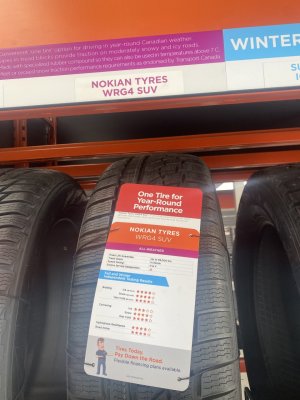
Similar threads
- Replies
- 109
- Views
- 14K
- Replies
- 81
- Views
- 14K
- Replies
- 3
- Views
- 2K
- Replies
- 6
- Views
- 4K
- Replies
- 1
- Views
- 2K

